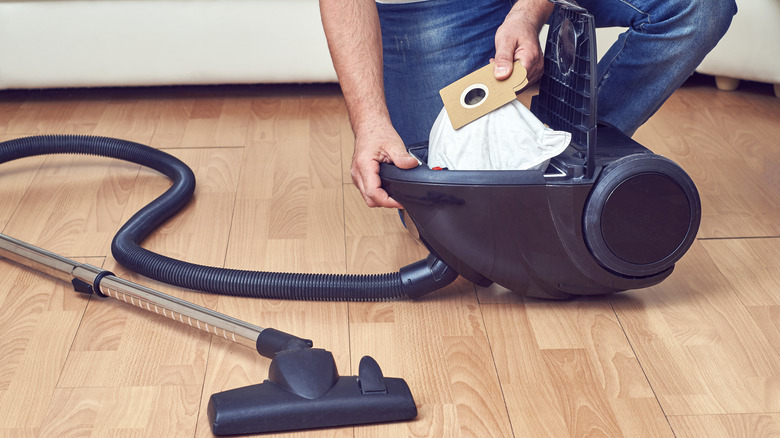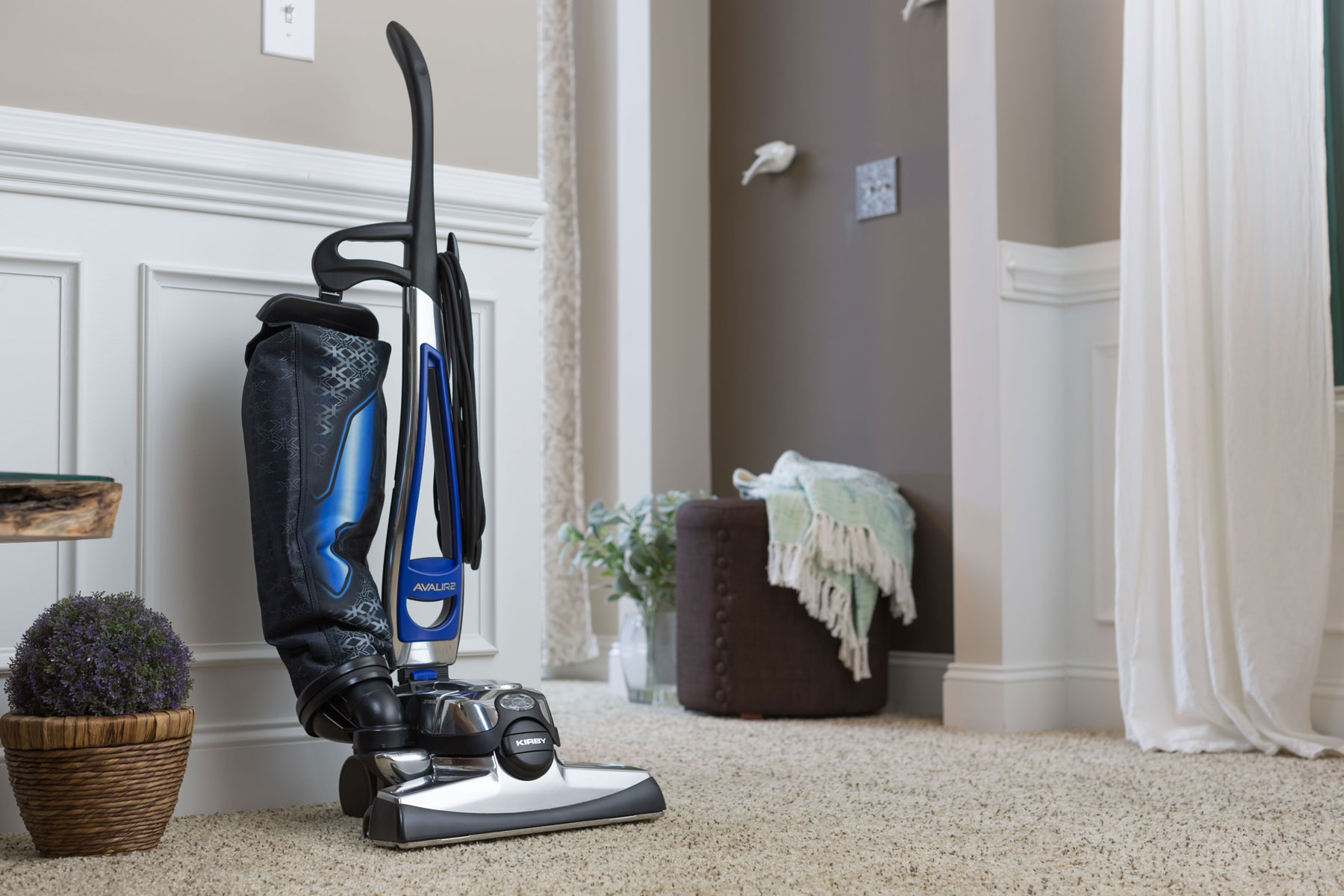You should change your vacuum cleaner bag when it’s about two-thirds full. This prevents loss of suction and keeps your home clean.
But how often should this be done? The frequency of changing your vacuum cleaner bag depends on several factors. These include the size of your home, the number of people, pets, and how often you vacuum. For instance, a large household with pets will fill a bag faster than a small apartment.
Using a vacuum with a full bag can reduce its efficiency and spread allergens. Regularly checking the bag and replacing it when necessary ensures optimal performance and a clean home. In this blog, we will explore the signs that indicate it’s time to change the bag and tips to make your vacuum cleaner work better.
Importance Of Changing Vacuum Cleaner Bags
Changing your vacuum cleaner bag regularly is crucial for maintaining your vacuum’s performance. A full or clogged bag can hamper your vacuum’s efficiency, leading to poor cleaning results. Let’s explore why changing the vacuum cleaner bag is so important.
Maintaining Efficiency
A vacuum cleaner works best when its bag is not full. When the bag is full, the vacuum must work harder. This reduces its suction power. Your vacuum will leave dirt and debris behind. Changing the bag regularly keeps your vacuum running smoothly. It ensures your floors stay clean.
Preventing Odors
Old vacuum bags can trap unpleasant odors. Dirt, dust, and pet hair can start to smell bad over time. A fresh bag helps prevent these smells. Your home will smell cleaner and fresher. Regularly changing the bag keeps your vacuum from spreading bad odors.

Credit: www.housedigest.com
Factors Affecting Bag Change Frequency
Changing the vacuum cleaner bag depends on several factors. Understanding these factors helps maintain your vacuum’s efficiency and prolongs its life.
Vacuum Usage
How often you use your vacuum affects bag change frequency. If you vacuum daily, the bag fills up faster. Regular cleaning of large areas also contributes to this. On the other hand, occasional use means the bag lasts longer. Consider your cleaning habits and adjust accordingly.
Floor Type
The type of floor impacts how quickly the bag fills. Carpets trap more dirt and debris than hard floors. Vacuuming carpets often fills the bag quickly. Hardwood or tile floors generate less dust. Thus, the bag fills at a slower rate. Take note of your home’s flooring to determine bag change frequency.
Signs Your Vacuum Bag Needs Changing
Keeping your vacuum cleaner in top condition is essential for efficient cleaning. One key aspect is changing the vacuum cleaner bag regularly. But how do you know when it’s time? Here are some signs your vacuum bag needs changing.
Reduced Suction
One of the most obvious signs is reduced suction. When the vacuum bag is full, the air can’t flow properly. This makes the vacuum lose power. You may notice dirt and debris are not picked up as easily. If your vacuum cleaner seems to be struggling, check the bag.
Full Bag Indicator
Many modern vacuum cleaners come with a full bag indicator. This handy feature tells you when the bag needs changing. Look for a light or a gauge on your vacuum. If the indicator shows the bag is full, it’s time to replace it.
| Sign | Description |
|---|---|
| Reduced Suction | Vacuum loses power and struggles to pick up debris |
| Full Bag Indicator | A light or gauge shows the bag is full |
Changing the vacuum bag regularly keeps your vacuum working well. It also ensures your home stays clean and healthy. Keep an eye out for these signs to know when to change the bag.

Credit: www.amazon.com
Impact Of Overfilled Bags
An overfilled vacuum cleaner bag can cause more harm than you might think. It affects the performance of your vacuum and can even lead to motor damage. Understanding the impact of overfilled bags helps maintain your vacuum’s efficiency and longevity.
Decreased Performance
Overfilled bags restrict airflow. This makes the vacuum work harder to pick up dirt. Less airflow means less suction power. With reduced suction, your vacuum cleans less effectively. You might notice more dust and debris left behind.
Also, overfilled bags can cause clogs. Clogs further reduce performance. Regularly changing the bag keeps your vacuum running smoothly. It ensures optimal performance every time you clean.
Motor Damage
Overfilled bags put extra stress on the motor. The motor works harder to compensate for the reduced airflow. This extra effort can overheat the motor. Overheating can lead to motor failure.
Replacing the vacuum bag before it gets too full prevents this stress. It protects the motor from damage. A healthy motor ensures your vacuum lasts longer. Regular bag changes are a small step that can save you costly repairs.
Recommended Bag Change Schedule
Maintaining a clean home is essential for a healthy living environment. Changing your vacuum cleaner bag regularly is a key part of this. But how often should you change it? The answer depends on how often you use your vacuum and the type of debris it collects. Below is a recommended schedule to help you keep your vacuum running efficiently.
Light Use Homes
If you vacuum once a week or less, consider changing the bag every three months. Light use homes usually have less dirt and debris. This means the vacuum bag fills up more slowly. Regular checks are still important. If the bag is more than half full, change it. A full bag reduces suction power and efficiency.
Heavy Use Homes
Homes with pets, kids, or frequent foot traffic need more frequent bag changes. If you vacuum several times a week, change the bag every month. Pet hair, dirt, and debris fill the bag quickly. Check the bag often. If it feels heavy or looks full, replace it. A full bag strains the vacuum motor, leading to potential damage.
Types Of Vacuum Cleaner Bags
Choosing the right vacuum cleaner bag is essential for maintaining your vacuum’s efficiency. There are two primary types of vacuum cleaner bags: disposable bags and reusable bags. Each type has its own set of benefits and drawbacks. Let’s explore them in detail.
Disposable Bags
Disposable bags are designed for single use. They are convenient and hygienic because you can easily discard them when they are full. These bags are made from paper or synthetic materials that can trap dust and allergens effectively.
- Pros:
- Easy to replace
- Reduces exposure to dust
- High filtration efficiency
- Cons:
- Ongoing cost of replacement bags
- Not environmentally friendly
Reusable Bags
Reusable bags are made from durable fabric materials. They can be emptied, cleaned, and reused multiple times. These bags are cost-effective in the long run and more eco-friendly.
- Pros:
- Cost-effective over time
- Eco-friendly
- Cons:
- Requires regular cleaning
- Exposure to dust during emptying
Here is a comparison table to help you decide:
| Feature | Disposable Bags | Reusable Bags |
|---|---|---|
| Ease of Use | Very Easy | Moderate |
| Cost | Higher over time | Lower over time |
| Environmental Impact | High | Low |
Proper Disposal Of Vacuum Bags
Changing the vacuum cleaner bag is important. It’s also vital to dispose of the used bag properly. Improper disposal can harm the environment. It can also pose health risks. Let’s explore the best ways to handle and dispose of vacuum bags.
Environmental Considerations
Used vacuum bags often contain dust, allergens, and debris. These materials can harm the environment if not disposed of correctly. Always check if the bag is biodegradable. If it is, it can go in the compost bin. Non-biodegradable bags should go in the general waste bin.
Recycling is another option. Some vacuum bags are recyclable. Look for recycling symbols on the packaging. If you see one, place the bag in the recycling bin. This helps reduce landfill waste and conserves resources.
Consider switching to reusable vacuum bags. They reduce waste and are eco-friendly. Reusable bags can be washed and used many times. This choice is both economical and environmentally friendly.
Safe Handling
Handling used vacuum bags requires care. They often contain harmful particles. Wear gloves to avoid direct contact. This prevents skin irritation and reduces the risk of allergies.
Seal the vacuum bag before disposal. This prevents dust and debris from escaping. Use a plastic bag to double-seal if necessary. This added layer of protection ensures safe handling.
Keep used vacuum bags away from children and pets. They may contain hazardous materials. Store them in a high place or a closed bin until disposal.
Follow local waste disposal guidelines. Some areas have specific rules for disposing of household waste. Check your local regulations to ensure compliance.
Expert Maintenance Tips
Maintaining your vacuum cleaner properly extends its lifespan and keeps your home clean. One crucial part of this is changing the vacuum cleaner bag. Here are some expert maintenance tips to help you understand the best practices.
Bag Replacement Techniques
Replacing the vacuum cleaner bag regularly is essential. Most experts recommend changing the bag when it is 2/3 full. Waiting too long can decrease the vacuum’s efficiency.
Follow these steps for easy bag replacement:
- Turn off and unplug the vacuum cleaner.
- Open the vacuum bag compartment.
- Remove the old bag carefully to avoid spilling dust.
- Insert the new bag according to the manufacturer’s instructions.
- Close the compartment securely.
Regularly check the bag for tears or damage. A damaged bag can leak dust and reduce suction power.
Additional Maintenance
Besides changing the vacuum cleaner bag, other maintenance tasks are also important. Here are some additional tips:
- Clean the filters: Clean or replace filters every 3-6 months to maintain optimal performance.
- Check the brushes and belts: Inspect the brushes and belts for wear and tear. Replace them if needed to ensure proper cleaning.
- Clear blockages: Regularly check the hose and attachments for blockages. Clearing any debris ensures maximum suction.
Proper maintenance keeps your vacuum cleaner running smoothly. It also ensures your home stays clean and dust-free.

Credit: news.kirby.com
Frequently Asked Questions
How Often Should I Change Vacuum Cleaner Bag?
You should change the vacuum cleaner bag when it is 2/3 full. This ensures optimal performance. Regularly check the bag to avoid overfilling. Overfilled bags can reduce suction power.
What Happens If I Don’t Change The Vacuum Bag?
Not changing the vacuum bag can lead to reduced suction power. It can also cause the vacuum to overheat. Additionally, it can release dust back into the air.
Can I Reuse A Vacuum Cleaner Bag?
Reusing a vacuum cleaner bag is not recommended. It can reduce efficiency and cause clogging. Disposable bags are designed for single use only.
How Do I Know When To Change The Vacuum Bag?
Check the bag’s fullness regularly. If it’s 2/3 full, it’s time to change it. Some vacuums have indicator lights to signal bag change.
Conclusion
Regularly changing your vacuum cleaner bag ensures better performance. It also extends the vacuum’s life. Check the bag monthly. Replace it when it’s half to two-thirds full. This keeps your home cleaner and healthier. Don’t wait until the bag is completely full.
Consistent maintenance is key. Follow these tips, and your vacuum will work efficiently. A well-maintained vacuum means a cleaner home environment. Keep an eye on the bag, and enjoy a cleaner space. Happy cleaning!




